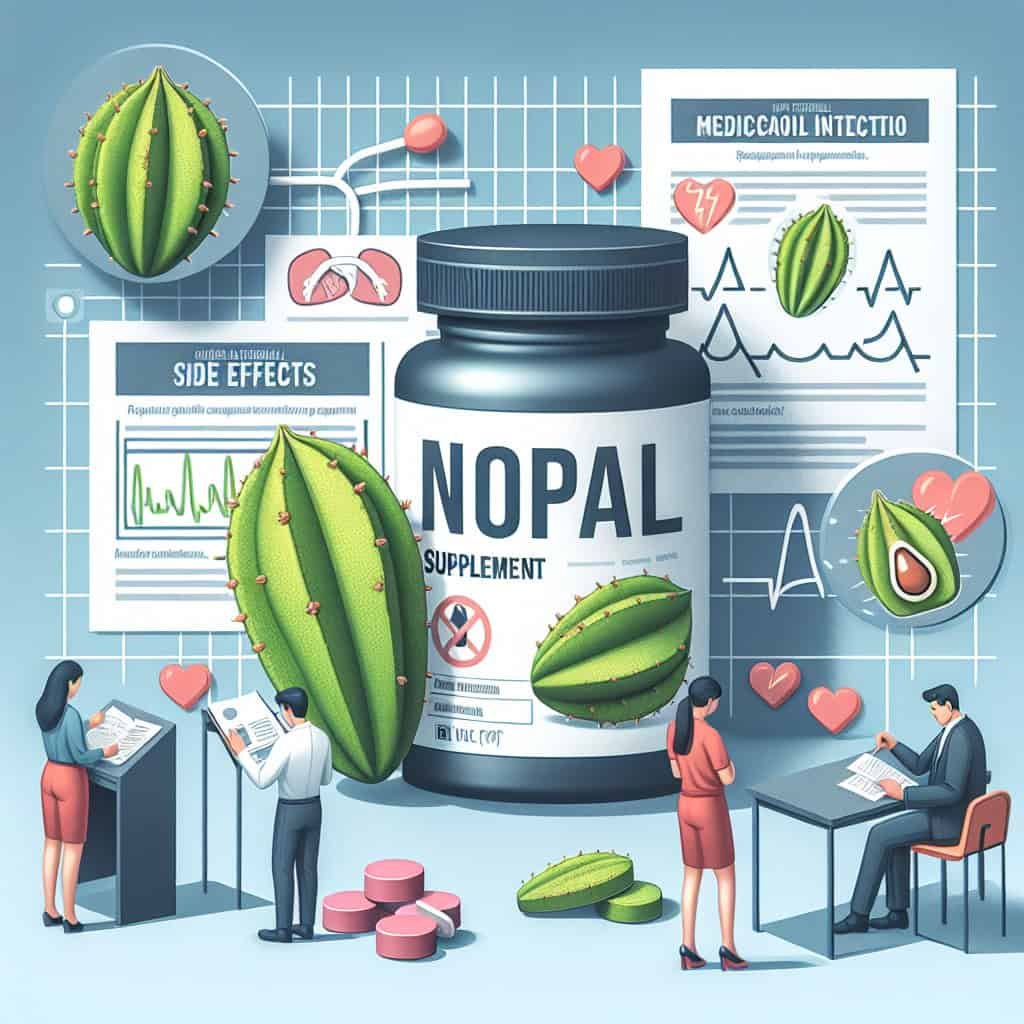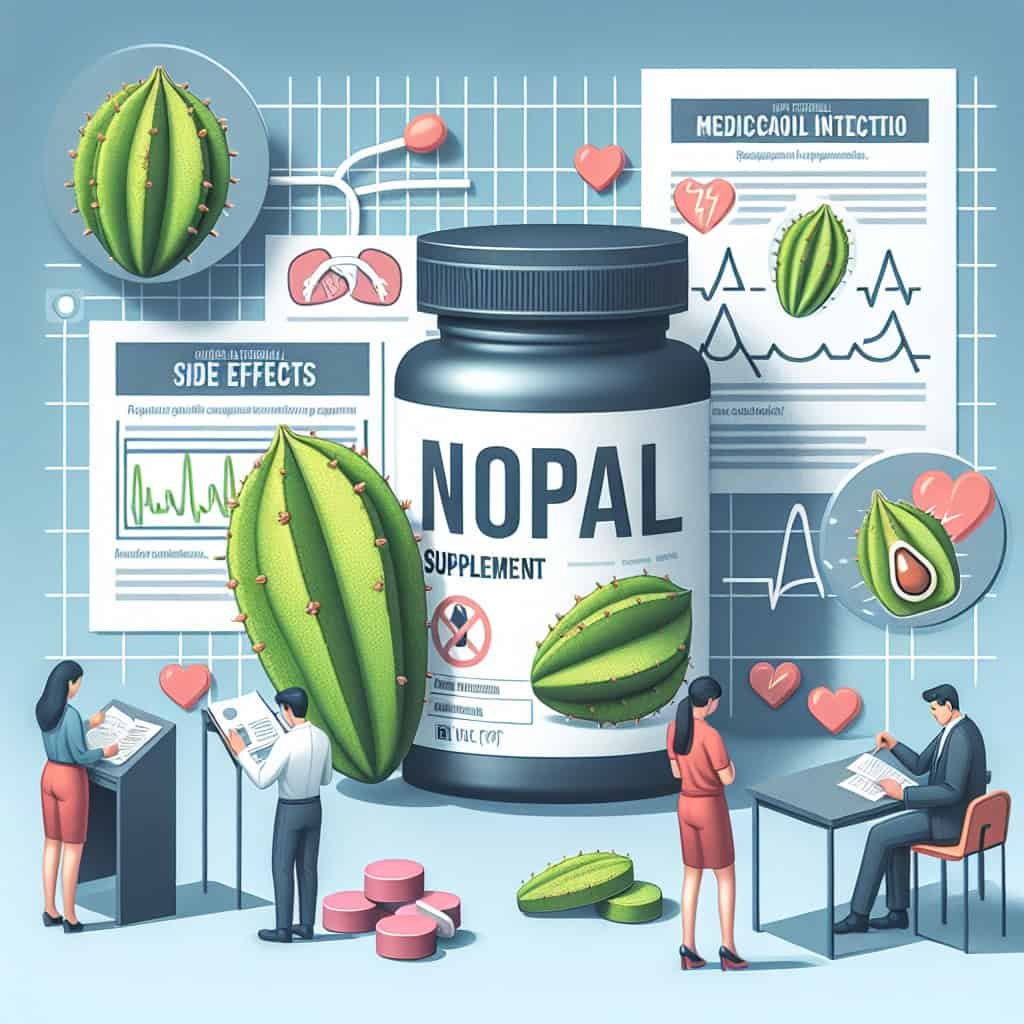Nopal supplements, derived from the prickly pear cactus, have gained popularity for their numerous health benefits. From aiding digestion to reducing inflammation, these supplements seem like a natural solution for many health issues. However, it is important to explore if there are any potential risks associated with consuming nopal supplements.
Gastrointestinal Issues
May Cause Nausea and Vomiting
When taking nopal supplements, there is a possibility that you may experience nausea and vomiting as side effects. This can be attributed to the high fiber content found in nopal. While fiber is generally beneficial for digestive health, consuming too much of it can lead to gastrointestinal discomfort. If you are prone to digestive issues, it is advisable to start with a small dose of nopal and gradually increase it, allowing your body to adjust.
Possible Diarrhea and Stomach Cramps
Along with nausea and vomiting, some individuals may also experience diarrhea and stomach cramps after taking nopal supplements. This can occur due to the high levels of fiber and mucilage present in the plant. Similar to the previous point, it is important to introduce nopal slowly into your diet to give your digestive system time to adapt. Staying adequately hydrated and consuming a balanced diet can also help alleviate these symptoms.
Risk of Dehydration
Nopal’s high fiber content, especially when consumed in large amounts, can have a dehydrating effect on the body. Fiber absorbs water in the digestive tract, which can lead to increased bowel movements and potential fluid loss. It is crucial to drink plenty of water throughout the day when incorporating nopal supplements into your routine. This will help prevent dehydration and ensure proper hydration levels are maintained.
Allergic Reactions
Potential for Allergic Asthma
In rare cases, individuals may experience allergic reactions to nopal supplements, which can manifest as allergic asthma. Symptoms may include coughing, wheezing, shortness of breath, and chest tightness. If you have a history of asthma or allergies, it is recommended to exercise caution when using nopal products. Seeking medical advice and undergoing an allergy test prior to starting nopal supplementation can help identify any potential risks.
Skin Allergies and Rashes
Another possible allergic reaction to nopal supplements is the development of skin allergies and rashes. These can range from mild redness and itching to more severe symptoms, such as hives or dermatitis. If you notice any skin abnormalities after consuming nopal, it is essential to discontinue use and consult a healthcare professional. They can provide guidance on how to manage the allergic reaction and recommend alternative supplements if necessary.
Anaphylactic Shock
Although extremely rare, there have been reported cases of anaphylactic shock associated with nopal consumption. Anaphylaxis is a severe allergic reaction that can be life-threatening if not treated promptly. Symptoms may include difficulty breathing, swelling of the face or throat, rapid heartbeat, and a drop in blood pressure. If you experience any of these symptoms after taking nopal supplements, it is essential to seek immediate medical attention.

Interference with Medications
Possible Drug Interactions
Nopal supplements have the potential to interact with certain medications, including those prescribed for chronic conditions. It is crucial to inform your healthcare provider about any supplements you are taking, including nopal, to ensure there are no adverse effects or interactions. Medications that thin the blood, such as anticoagulants or antiplatelet drugs, may be particularly affected when taken concurrently with nopal.
Effect on Blood Pressure Medications
Some studies suggest that nopal may have a blood pressure-lowering effect, which can be beneficial for individuals with hypertension. However, if you are already taking medications to manage your blood pressure, combining them with nopal supplements may result in an excessive drop in blood pressure. It is important to monitor your blood pressure regularly and consult your doctor for appropriate dosage adjustments if needed.
Impact on Diabetes Medications
Nopal has been studied for its potential effects on blood sugar control, which may be advantageous for individuals with diabetes. However, combining nopal with certain diabetes medications, such as insulin or oral blood glucose-lowering drugs, can lead to hypoglycemia (low blood sugar). If you have diabetes and are considering using nopal supplements, it is crucial to closely monitor your blood sugar levels and consult with your healthcare provider for guidance on medication adjustments.
Kidney Complications
Increased Urine Output
Nopal’s diuretic properties may lead to an increased urine output in some individuals. While this can be beneficial for individuals who retain excess fluid, such as those with edema or certain kidney conditions, it can put a strain on the kidneys in others. If you have a history of kidney problems or are taking medications that affect kidney function, it is essential to consult with your healthcare provider before incorporating nopal supplements into your routine.
Risk of Kidney Stones
Due to its high oxalate content, prolonged and excessive nopal supplementation may increase the risk of developing kidney stones. Oxalates can bind to calcium, forming crystals that can accumulate in the kidneys and lead to stone formation. To reduce the risk, it is advisable to consume an adequate amount of fluids and ensure a balanced diet that includes calcium-rich foods alongside nopal supplements. However, individuals with a history of kidney stones or calcium oxalate-related conditions should exercise caution and consult with their healthcare provider.
Worsening Kidney Disease
Individuals with advanced kidney disease or those undergoing dialysis may need to avoid nopal supplementation. The kidneys play a vital role in filtering waste products from the blood, and an impaired kidney function cannot efficiently eliminate substances like nopal’s natural compounds. This can potentially increase the risk of further kidney damage and should be discussed with a healthcare professional to determine the suitability of nopal supplements.

Hypoglycemia
Potential Blood Sugar Reduction
Nopal has been studied for its potential hypoglycemic effects, meaning it can lower blood sugar levels. While this can be beneficial for individuals with diabetes or prediabetes, it can pose a risk for people with normal blood sugar levels or those prone to hypoglycemia. If you do not have diabetes but are considering nopal supplementation, it is essential to monitor your blood sugar levels regularly and consult with a healthcare provider if you experience symptoms of low blood sugar.
Increased Risk for Those With Diabetes
Individuals with diabetes who are taking medications to manage their blood sugar levels need to exercise caution when using nopal supplements. Combining nopal with diabetes medications can potentially enhance the blood sugar-lowering effects, leading to hypoglycemia. Proper monitoring of blood sugar levels, regular communication with a healthcare provider, and potential dose adjustments are crucial to manage blood sugar effectively while incorporating nopal into one’s routine.
Safety Precautions for Diabetic Patients
For individuals with diabetes considering nopal supplementation, it is important to practice safety precautions. These may include regular blood sugar monitoring, maintaining a well-balanced diet that aligns with dietary recommendations for diabetes management, and collaborating closely with a healthcare provider. By following these precautions, individuals with diabetes can better manage their blood sugar levels while incorporating nopal into their overall diabetes management plan.
Electrolyte Imbalance
Disturbance in Sodium and Potassium Levels
Nopal’s diuretic properties, combined with its high potassium content, can potentially disrupt the balance of sodium and potassium in the body. Excessive potassium intake can lead to a condition called hyperkalemia, characterized by high levels of potassium in the blood. Conversely, increased urine output associated with nopal’s diuretic effect may lead to sodium depletion. Individuals with certain medical conditions, such as kidney disease or heart conditions, need to be mindful of electrolyte imbalances and consult with a healthcare provider before using nopal supplements.
Risk of Cardiac Arrhythmias
Electrolyte imbalances, particularly high levels of potassium or low levels of sodium, can increase the risk of cardiac arrhythmias. These irregular heart rhythms can be potentially dangerous and may require medical intervention. If you have a history of heart conditions, it is important to discuss nopal supplementation with your healthcare provider, who can determine its suitability based on your specific medical situation.
Depletion of Essential Minerals
In addition to disturbances in sodium and potassium levels, excessive nopal consumption can potentially deplete essential minerals in the body, such as calcium and magnesium. These minerals play crucial roles in various bodily functions, including bone health, muscle contractions, and nerve signaling. It is important to take a well-rounded approach to nutrition and ensure adequate intake of these minerals through a balanced diet alongside nopal supplementation.

Low Calcium Absorption
Potential Impact on Calcium Levels
Nopal contains oxalates, compounds that can bind to calcium and interfere with its absorption. Prolonged and excessive nopal supplementation may contribute to decreased calcium absorption, potentially leading to lower calcium levels in the body. Calcium is essential for maintaining strong bones and teeth, as well as proper muscle and nerve function. To mitigate the impact on calcium absorption, it is advisable to consume nopal alongside calcium-rich foods or consider calcium supplementation as recommended by a healthcare provider.
Concerns for Bone Health
Lower calcium levels resulting from reduced absorption can have long-term implications for bone health. Inadequate calcium intake over time can contribute to weaker bones and increase the risk of conditions like osteoporosis. If you are at risk for osteoporosis, have a calcium deficiency, or are concerned about your bone health, it is important to discuss nopal supplementation with your healthcare provider. They can evaluate your specific needs and recommend appropriate measures to support bone health alongside nopal use.
Adverse Effects on Teeth
When calcium absorption is compromised, it can also have adverse effects on dental health. Deficiencies in calcium can weaken tooth enamel, making teeth more susceptible to decay and cavities. If you have concerns about dental health or are prone to dental issues, it is important to maintain good oral hygiene practices while considering nopal supplementation. Regular dental check-ups and professional cleanings are also vital to monitor and maintain oral health.
Liver Damage
Possibility of Hepatotoxicity
In rare cases, nopal supplements have been associated with hepatotoxicity, which refers to liver damage or toxicity. While the exact mechanisms are not well understood, it is believed to occur due to the presence of certain compounds in nopal that may be harmful to the liver in some individuals. To minimize the risk, it is recommended to use nopal supplements as directed, not exceeding the recommended dosage. If you experience any signs of liver damage, such as jaundice, abdominal pain, or changes in urine or stool color, it is essential to seek medical attention immediately.
Long-term Nopal Use and Liver Health
Long-term and excessive use of nopal supplements may pose an increased risk to liver health. Although more research is needed to fully understand the long-term effects, it is important to exercise caution and attentiveness to any potential changes in liver function or overall well-being. Monitoring liver enzymes through regular blood tests, as advised by a healthcare provider, can help detect any potential liver damage or abnormalities at an early stage.
Monitoring Liver Function
Given the potential risk of liver damage associated with nopal use, it is recommended to monitor liver function regularly when incorporating nopal supplements into your routine. Regular blood tests that evaluate liver enzymes, such as aspartate aminotransferase (AST) and alanine aminotransferase (ALT), can provide insight into liver health. This monitoring, in combination with open communication with a healthcare provider, ensures early detection of any liver-related issues and allows for prompt intervention if necessary.

Interaction with Pregnancy
Possible Effects on Fertility
Limited research exists on the effects of nopal supplements on fertility. While no direct correlation has been established between nopal use and fertility issues, caution is advised for individuals trying to conceive. If you are actively trying to get pregnant, it is important to consult with a healthcare provider before starting or continuing nopal supplementation to ensure its safety and suitability in your particular situation.
Concerns during Pregnancy
Pregnant individuals should exercise caution when considering nopal supplementation. The limited data available on nopal’s impact during pregnancy warrant careful consideration and consultation with a healthcare provider. It is crucial to prioritize the health and well-being of both the mother and the developing fetus. If you are pregnant or planning to become pregnant, it is essential to discuss nopal supplementation with your obstetrician or midwife before incorporating it into your routine.
Safety Precautions for Expecting Mothers
If your healthcare provider determines that nopal supplementation is safe for you during pregnancy, it is important to follow their recommendations and guidance. Maintaining regular prenatal care appointments, adhering to a well-balanced diet, and monitoring for any potential adverse effects or changes in health are all crucial steps for ensuring the well-being of both mother and baby. Open communication and ongoing collaboration with your healthcare provider are essential during this time.
Potential Weight Gain
Increased Appetite and Cravings
Nopal supplements have been reported to potentially increase appetite and cravings in some individuals. While this can be beneficial for individuals with certain medical conditions that require weight gain, it may pose challenges for those aiming to manage or lose weight. If you are concerned about weight gain or have a history of disordered eating, it is important to discuss potential appetite changes with your healthcare provider before incorporating nopal supplements into your routine.
Impact on Weight Management Efforts
If you are actively trying to manage your weight, nopal supplementation may affect your weight management efforts. The increased appetite and cravings associated with nopal can make it challenging to adhere to a calorie-controlled diet. However, it is important to note that individual responses can vary, and some individuals may not experience significant changes in appetite or cravings. Monitoring and adjusting your dietary strategies as necessary, in consultation with a healthcare provider or registered dietitian, can help you navigate potential weight management challenges while incorporating nopal into your routine.
Balancing Caloric Intake with Nopal Supplementation
To maintain a balanced approach to weight management while using nopal supplements, it is important to be mindful of your overall caloric intake. If you notice increased appetite or cravings, focus on incorporating nutrient-dense foods and maintaining portion control. Consulting with a healthcare provider or registered dietitian can provide personalized guidance and help develop a comprehensive dietary plan that addresses your specific weight management goals alongside nopal supplementation.
In conclusion, while nopal supplements can offer potential health benefits, it is crucial to be aware of the potential risks associated with their use. Gastrointestinal issues such as nausea, vomiting, diarrhea, and stomach cramps can occur, along with a risk of dehydration. Allergic reactions, interference with medications, kidney complications, hypoglycemia, electrolyte imbalance, low calcium absorption, liver damage, interaction with pregnancy, and potential weight gain are important considerations as well. It is essential to consult with a healthcare provider before starting or continuing nopal supplementation, especially if you have any pre-existing health conditions or are taking medications. With appropriate caution and guidance, you can make informed decisions about incorporating nopal supplements into your daily routine while minimizing potential risks.


